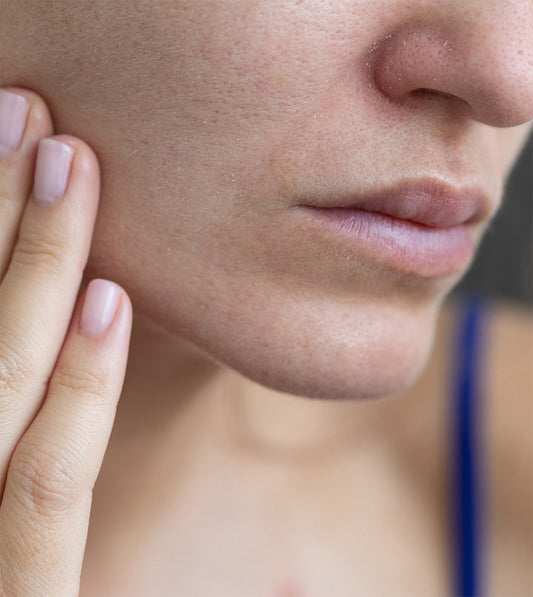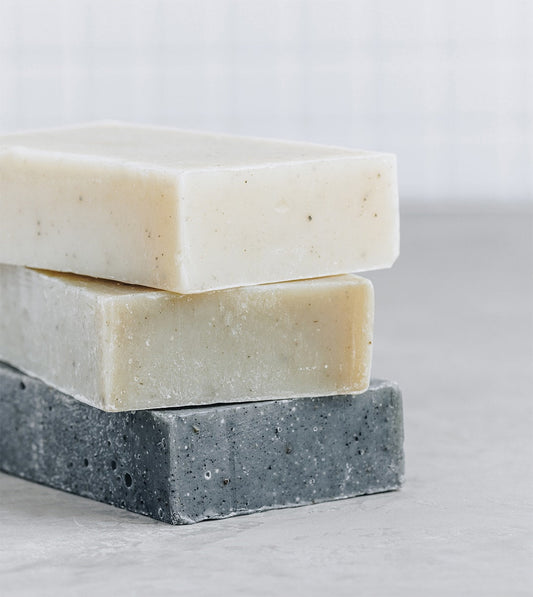SKINCARE
What Does Hyaluronic Acid Do For Your Skin?

There are so many different skincare ingredients out there, from natural plant extracts and oils to complicated chemical compounds and acids. Hyaluronic acid is one of the most effective and essential skin care ingredients out there to use in any skin care routine.
So, what exactly is hyaluronic acid and what does it do for your skin? In this guide, we'll cover all you need to know about hyaluronic acid skin care, such as the benefits of hyaluronic acid, its top uses, its downside, and the best skin types for hyaluronic acid.
What Is Hyaluronic Acid Skin Care?
Before we look at what does hyaluronic acid do for skin, it's important to start off with a clear definition of what this acid is and why it's such a big part of so many popular skin care products nowadays, like Kind Science Firming Serum and many best-selling products from other brands around the globe.
Hyaluronic acid, which can also be known as hyaluronan or hyaluronate, is a naturally-occurring substance that scientists have found in various parts of the human body, like the eyes and the skin. Scientifically-speaking, it's known as a glycosaminoglycan, which is a complicated-sounding term that basically just means a long-chain sugar.
How Does Hyaluronic Acid Work?
So, what does hyaluronic acid do for your skin? Well, this famous skin care ingredient is one of the key components in providing structure and stability for your skin, and it also helps to keep skin cells looking and feel plump and hydrated. This science behind all of this can be a little complicated, but we’ll break it down into a simple explanation.
Essentially, if you were to look at hyaluronic acid at a microscopic level, you'd see that it's made up of long, chain-like molecules. Each of these molecules has lots of points on it where other chemicals or compounds can attach, and this makes hyaluronic acid really effective at essentially grabbing onto other molecules or compounds and transporting them through your body.
Most importantly, this acid is great at getting water through your body to your skin's cells. Studies show that only a tiny amount of hyaluronic acid is needed to transport a whole gallon of water, and this makes it really effective at drawing water to your cells and keeping it there. In simpler terms, hyaluronic acid holds water molecules in place around the surface of your skin to keep it smooth and well-moisturized.
The Benefits of Hyaluronic Acid Skin Care
So, we've seen what this acid is and how it works, but what are some of the benefits of hyaluronic acid and what can you expect to feel and notice in your skin if you use products with this ingredient? Well, one of the reasons why hyaluronic acid skin care products are so popular nowadays is because this acid has a lot of advantages to offer:
Hydration
Arguably the biggest and best benefit of hyaluronic acid for the skin is its power to make cells hydrated. As explained above, this acid is an amazing transporter of water, and only a small amount can be used to carry lots of water around the body. It’s really effective at bringing moisture to skin cells and keeping them healthy and hydrated. Well-moisturized skin cells are much stronger than those that are left to dry out.
Moisture Retention
Following on from the previous point, one of the best things about hyaluronic acid is that it doesn’t just get moisture into your skin, but it also keeps it there. In simple terms, it’s really effective at holding or securing water molecules in place, so it can keep moisture in and around the top layer of skin cells. Even if your skin is exposed to dry air or other harsh conditions, hyaluronic acid can help to keep the cells moist.
Improving Complexion
Another brilliant benefit of hyaluronic acid is how it can help to even out and improve the look and feel of a person’s complexion. Many people find that, after using hyaluronic acid skin care products for a while, their skin looks more youthful and radiant and has a smoother, softer texture under their fingertips. This is all thanks to hyaluronic acid’s amazing powers of hydration and the general boost it can provide to skin health.
Anti-Aging
Aging is a natural process that takes its toll on the skin, leading to wrinkles, saggy areas, fine lines, and other visual changes. Many people look for skin care products that can help to slow down those signs of aging, and products containing hyaluronic acid can be very effective in this regard. By helping with overall skin health and hydration, hyaluronic acid can make the skin stronger and more resistant to wrinkles and other issues.
Faster Healing and Less Scarring
Another one of the interesting benefits of hyaluronic acid skin care solutions is their ability to help your skin healer faster from wounds and injuries. Studies have shown that this unique compound plays a big part in cell regeneration, helping damaged areas to recover quickly and efficiently. Not only that, but by speeding up the healing process, this acid also helps to reduce scarring.
Hyaluronic Acid Skin Care Side Effects
So, is hyaluronic acid safe? And are there any weaknesses to this product or notable side effects you need to be aware of? Well, firstly, we can confirm that hyaluronic acid is safe. It's a naturally-occurring compound that the body makes and uses, and research shows that it's generally one of the safest skincare ingredients.
There's always a chance of a rare allergic or adverse reaction to this compound, but it's highly unlikely. In addition, since hyaluronic acid is such a good transporter of other compounds, there's also a risk that it can bring unwanted chemicals or even bacteria into the skin. But, once again, this is very unlikely and hyaluronic acid products are specially-formulated to be as safe as possible.
Best Skin Types for Hyaluronic Acid
You might also like to know if hyaluronic acid works best on certain skin types and if people with certain skin types should avoid this ingredient. In reality, hyaluronic acid can provide benefits for absolutely any skin type, including those with sensitive skin. It’s safe to apply on dry, normal, sensitive, oily, and combination skin.




